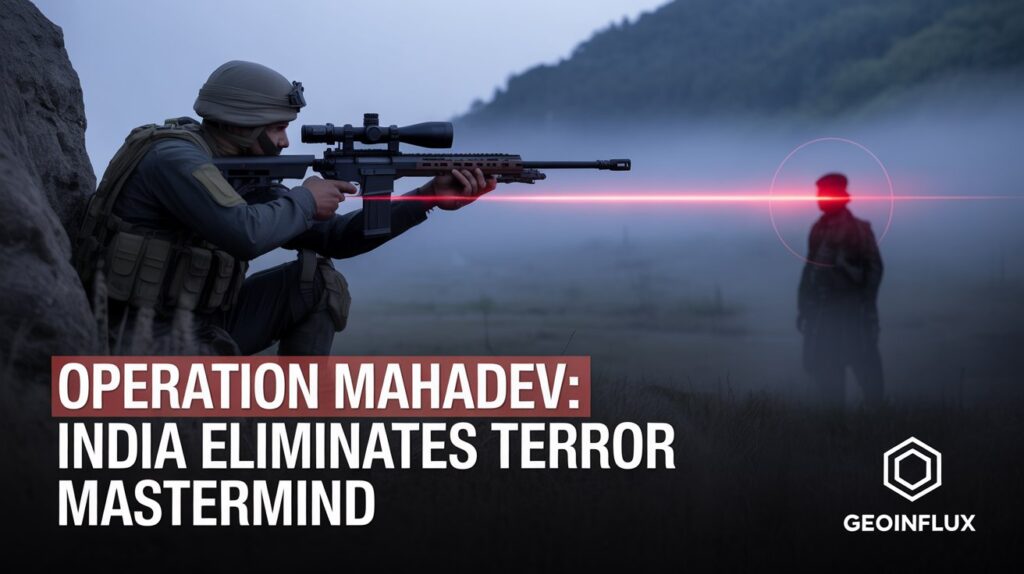India avenges the Pahalgam Attack through Operation Mahadev, neutralising Lashkar commander Suleiman Shah. A powerful message under Operation Sindoor targeting Pakistan’s terror blueprint.
🪖 Introduction: Operation Mahadev Unleashed
In a decisive display of precision and resolve, India launched Operation Mahadev, eliminating Suleiman Shah — the Lashkar-e-Taiba commander accused of masterminding the 2025 Pahalgam Attack.
Carried out under the broader Operation Sindoor campaign, this targeted mission represents a critical evolution in India’s counterterrorism strategy, seamlessly combining hard power, actionable intelligence, and tech-driven strike capabilities.
Far beyond a mere act of retaliation, India sends a clear strategic signal to Pakistan and the wider region: India will respond swiftly, relentlessly, and without ambiguity to cross-border terrorism.
Over the years, India’s armed forces have executed several high-risk operations across the Line of Control (LoC) — each reinforcing a doctrine that fuses deterrence with political messaging.
This latest action reflects a growing pattern of surgical precision, where the objective isn’t just elimination, but reshaping the rules of engagement in South Asia’s volatile security landscape.
🧨 Who Was Suleiman Shah: Terror Mastermind or Pakistan’s Proxy?
Suleiman Shah, also known as Hashim Moosa, was no ordinary militant. Once part of the Pakistan Army’s Special Services Group (SSG), Shah defected and became a key figure within Lashkar-e-Taiba (LeT) and its shadow proxy, The Resistance Front (TRF).
💰 India had placed a ₹20 lakh bounty on his head.
According to intel reports, Shah was:
- The planner of the deadly Pahalgam Attack (2025)
- Operating out of Pakistan-occupied Kashmir
- The bridge between Pakistan’s deep state and Kashmir-based terror modules
His elimination is not just a tactical success but a psychological blow to Pakistan’s asymmetric warfare.
⚔️ Operation Mahadev: India’s Answer Under Operation Sindoor
Conducted by Indian special units and aided by real-time intelligence, Operation Mahadev:
- Took place in Pulwama, South Kashmir
- Involved zero civilian casualties
- Was part of the multi-tiered Operation Sindoor initiative, launched after the Pahalgam tragedy
Operation Sindoor combines:
- Human intelligence (HUMINT)
- Tech-based surveillance
- AI-assisted target verification
- Narrative counter-warfare against radical online propaganda
📍 India is redefining warfare — boots, bytes, and brains.
🌍 Pakistan’s Terror Blueprint: Once Again in the Spotlight

Suleiman Shah’s profile exposes a chilling truth — Pakistan’s military establishment continues to nurture, train, and deploy jihadist operatives under the guise of ‘local resistance’.
The international community, especially after the TRF’s US terror designation, can no longer ignore:
- Cross-border movement of trained militants
- Direct Pakistani military involvement
- Radicalisation pipelines operating via proxy groups like TRF and LeT
❗ Operation Mahadev is proof of state-sponsored terrorism, not just India’s claim.
A retired Indian Army officer commented that such missions are “part of a calibrated doctrine,” reinforcing deterrence without overtly violating international norms.
He added that “not every strike is about retaliation — some are about rewriting rules of engagement.”
🏏 Should India Still Play Cricket with Pakistan?
The aftermath of Operation Mahadev has sparked renewed calls to cut all cultural and sporting ties with Pakistan.
With each terror attack and every retaliatory operation, public opinion becomes firmer: Why normalise relations with a terror-exporting regime?
Top commentators argue:
- Cricket diplomacy has failed repeatedly
- Every attack finds its roots in Pakistan’s soil
- Bilateral silence, not sports, sends a stronger message
🧠 New Age Warfare: Scholar, Soldier, Coder
India’s counter-terror narrative is changing:
- 📚 Scholar-warriors documenting and exposing terror networks
- 💻 Cyber units disrupting online radicalisation
- 🪖 Commandos striking with precision
Operation Mahadev is as much a story of new-age warriors as it is about boots on the ground.
While the latest Indian cross-border action drew immediate international attention, it also aligns with a broader strategic trend where South Asian powers project strength to manage internal dissent and external threats simultaneously.
✅ Key Takeaways
- Operation Mahadev neutralised the top LeT/TRF commander, Suleiman Shah
- Shah was a former Pakistani Army SSG turned jihadi terrorist
- This operation was part of Operation Sindoor, a new Indian doctrine post-Pahalgam attack
- Shah’s death is a strategic and symbolic blow to Pakistan’s proxy war
- The incident reopens debate on India’s cultural, sporting, and diplomatic ties with Pakistan
Indian media coverage emphasised the success of covert missions but also raised questions about escalation risks, diplomatic backlash, and the timing of these operations in relation to ongoing political narratives.
📊 Summary Recap Table
| Parameter | Details |
|---|---|
| Operation Name | Operation Mahadev |
| Target Eliminated | Suleiman Shah (aka Hashim Moosa) |
| Group Affiliation | Lashkar-e-Taiba (LeT), The Resistance Front (TRF) |
| Past Role | Pakistan Army SSG Commando |
| Reward | ₹20 lakh |
| Mission Type | Surgical strike under Operation Sindoor |
| Intel Used | Real-time, tech-based surveillance |
| Geopolitical Signal | Pakistan’s role in terrorism once again exposed |
| Domestic Debate Sparked | Re-evaluation of India-Pakistan sporting ties |
❓FAQs
What is Operation Mahadev?
A high-level Indian counter-terror strike under Operation Sindoor, targeting LeT commander Suleiman Shah, responsible for the Pahalgam Attack 2025.
Who was Suleiman Shah?
A former Pakistan Army special forces commando, Shah, became a top Lashkar/TRF commander. He was killed in Pulwama.
How is Operation Mahadev connected to Pakistan?
Shah’s military training and terror role prove Pakistan’s deep involvement in cross-border terrorism in Kashmir.
What is Operation Sindoor?
India’s new multi-pronged counter-terror framework involving special ops, tech intelligence, and info-warfare launched after the Pahalgam massacre.
Why is there talk of banning cricket with Pakistan?
India’s public questions the validity of cultural ties with a terror-supporting state, especially after deadly attacks and retaliatory operations.
🔗 Related Articles from GeoInflux.com
- TRF Terrorist Designation: India Scores Big Win as US Blacklists Pakistan-Backed Group
- India Fires Back: NATO’s ‘Double Standards’ Challenged as Geopolitical Chessboard Shifts Towards a Resurgent RIC Alliance
- Donald Trump’s India-Pakistan War Claims Resurface Amidst Mounting Domestic Pressure
📚 References
- Operation Mahadev: Pahalgam terror mastermind Sulieman killed near Srinagar – The Economic Times
- Operation Sindoor: India destroys terror camps in PoK linked to Pahalgam attack – India TV News
- How India Planned Operation Sindoor in 15 Days After the April 22 Terror Attack – NDTV
- Why India Named Its Retaliation Operation ‘Sindoor’ – Business Standard
- Op Sindoor Showed Terrorism in India Is Pak-Sponsored: Amit Shah – The Economic Times
- Operation Sindoor Continues, Preparedness Must Be High: CDS Chauhan – Times of India
- India Didn’t Bow to Pressure to End Fighting with Pakistan: Defence Minister – Reuters
- Timeline: From Pahalgam Attack to Operation Sindoor and Aftermath – NDTV
🙏 Thank You for Reading
We appreciate you taking the time to engage with this important analysis on Operation Mahadev and India’s evolving counterterrorism doctrine. At GeoInflux, our goal is to bring you accurate, insightful, and timely updates on geopolitical shifts that shape the world — from South Asia to the global stage.
Your continued support helps us stay committed to truth, clarity, and independent analysis.
Stay informed. Stay empowered.
🔔 Follow us for more updates on India’s strategic actions, defense policies, and global alignments.





Pingback: Operation Sindoor Fallout: PM Modi Exposes Trump’s 29 False Ceasefire Claims in Shocking Parliament Clash - GeoInflux
Pingback: India's S-400 Missile Defense System Downs 6 Pakistani Jets in Operation Sindoor – Unseen Footage & Details Emerge - GeoInflux
I?¦ve learn several just right stuff here. Definitely worth bookmarking for revisiting. I surprise how so much attempt you set to make one of these excellent informative site.